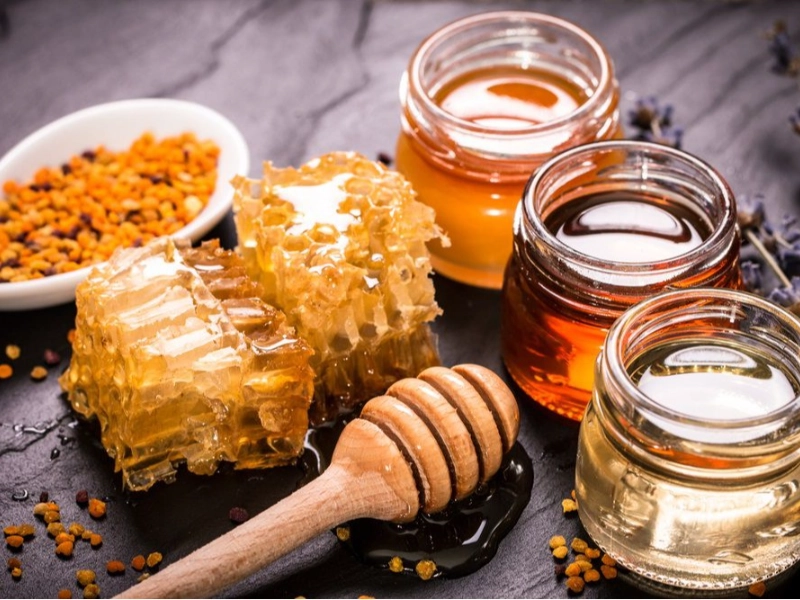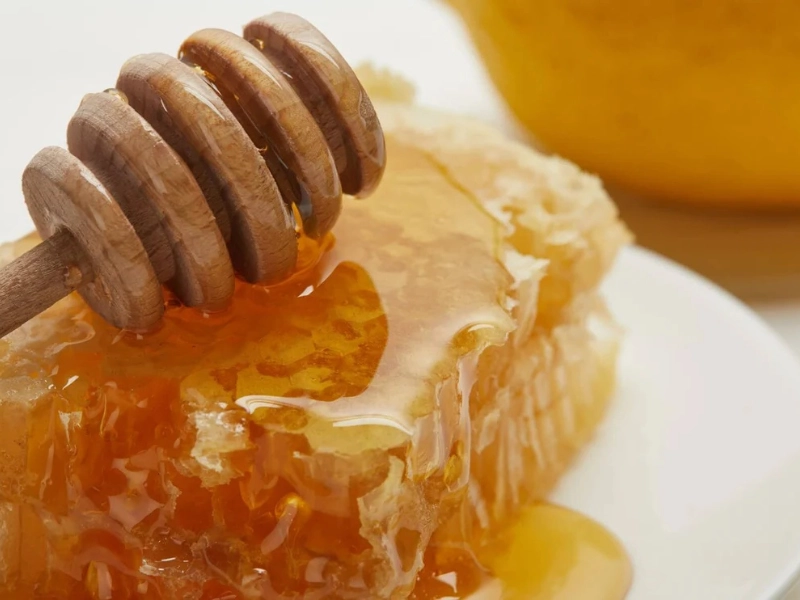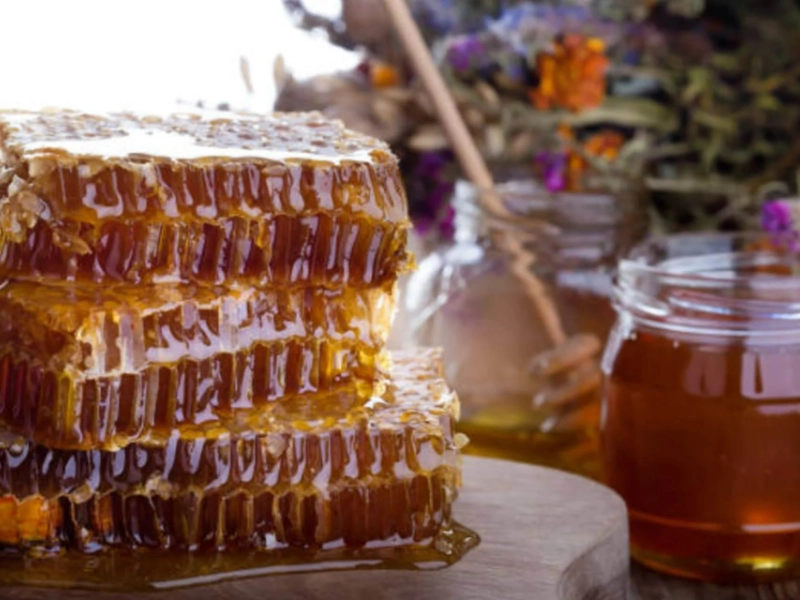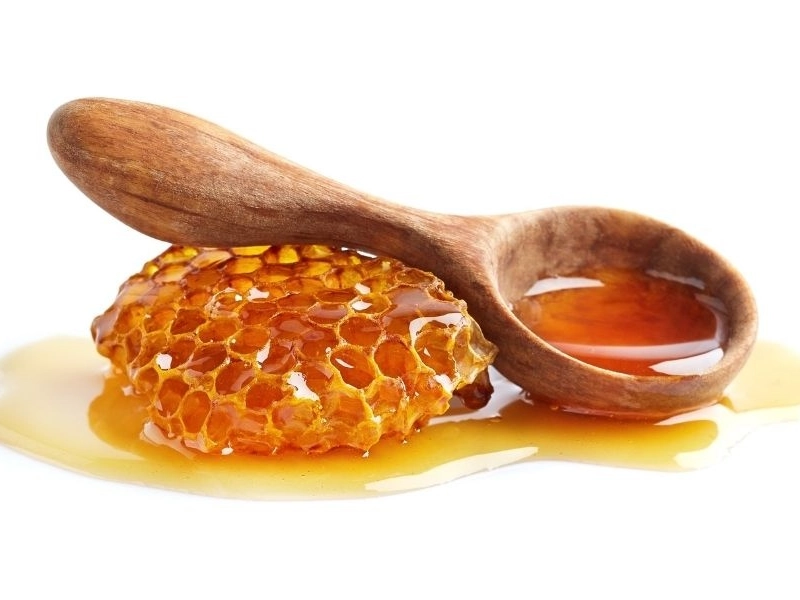Honey is a natural sweetener rich in antioxidants, which help protect against oxidative stress. It also possesses antimicrobial and wound-healing properties. The antioxidant activity of honey has been evaluated using various techniques, including melissopalynology and DPPH free radical scavenging assays. Results indicate that the antioxidant content and activity of honey samples can vary significantly based on their floral and geographical origins.

 Honey has been used as both food and medicine since ancient times, known for its antimicrobial, antioxidant, anti-inflammatory, antiproliferative, and anticancer properties. It is rich in vitamins, minerals, amino acids, polyphenols, and various volatile compounds. Honey has been shown to stimulate apoptosis, inhibit lipoprotein oxidation, and modulate .
The water-soluble vitamin content in honey varies depending on the floral and geographical source of the nectar, with Vitamin C being the most common. Up to 31 different minerals have been reported in honey samples.
While honey is a healthier alternative to sugar, it can still affect blood sugar levels and should be consumed in moderation. Raw, unpasteurized honey is recommended for maximum health benefits, but if unavailable, certified organic honey is a suitable alternative.
Honey has been used as both food and medicine since ancient times, known for its antimicrobial, antioxidant, anti-inflammatory, antiproliferative, and anticancer properties. It is rich in vitamins, minerals, amino acids, polyphenols, and various volatile compounds. Honey has been shown to stimulate apoptosis, inhibit lipoprotein oxidation, and modulate .
The water-soluble vitamin content in honey varies depending on the floral and geographical source of the nectar, with Vitamin C being the most common. Up to 31 different minerals have been reported in honey samples.
While honey is a healthier alternative to sugar, it can still affect blood sugar levels and should be consumed in moderation. Raw, unpasteurized honey is recommended for maximum health benefits, but if unavailable, certified organic honey is a suitable alternative.
 Honey contains a variety of phytoconstituents, antioxidants, and essential minerals that contribute to its anti-inflammatory properties. Research indicates that total flavonoid content and Vitamins B1 and C correlate well with honey's antioxidant activity. This includes DPPH free radical scavenging activity, ferric reducing antioxidant power, and β-carotene bleaching inhibition, along with a reduction in proinflammatory cytokines like IL-6, TNF-α, and inducible nitric oxide synthase (iNOS).
The antioxidant composition of honey is influenced by its floral and geographical origins. The abundance of Rosaceae and Fabaceae families, which significantly impact honey's antioxidant activity, increases with altitude up to 3000 m. However, the distribution and frequency of these families can vary based on geographical coordinates. Major cationic elements such as sodium (Na), potassium (K), calcium (Ca), magnesium (Mg), and zinc (Zn), along with trace elements like iron (Fe), copper (Cu), chromium (Cr), cobalt (Co), molybdenum (Mo), and nickel (Ni), are found in varying concentrations in honey samples.
Honey contains a variety of phytoconstituents, antioxidants, and essential minerals that contribute to its anti-inflammatory properties. Research indicates that total flavonoid content and Vitamins B1 and C correlate well with honey's antioxidant activity. This includes DPPH free radical scavenging activity, ferric reducing antioxidant power, and β-carotene bleaching inhibition, along with a reduction in proinflammatory cytokines like IL-6, TNF-α, and inducible nitric oxide synthase (iNOS).
The antioxidant composition of honey is influenced by its floral and geographical origins. The abundance of Rosaceae and Fabaceae families, which significantly impact honey's antioxidant activity, increases with altitude up to 3000 m. However, the distribution and frequency of these families can vary based on geographical coordinates. Major cationic elements such as sodium (Na), potassium (K), calcium (Ca), magnesium (Mg), and zinc (Zn), along with trace elements like iron (Fe), copper (Cu), chromium (Cr), cobalt (Co), molybdenum (Mo), and nickel (Ni), are found in varying concentrations in honey samples.
 As research uncovers more health benefits of honey, ensuring you choose high-quality honey is essential. The first step is to verify that your honey is pure and free from dilution with substances like corn syrup or preservatives.
Look for labels indicating "pure honey" or certified organic options. Avoid honey that has been pasteurized or filtered, as these processes can strip away many antioxidants and phytonutrients.
A simple test to assess honey quality involves holding two sealed jars of the same brand up to the light. Honey with lower water content will appear thicker and more opaque, making it less likely to crystallize over time. Tropical Traditions raw honey is an excellent example of a high-quality, non-GMO product that is tested for glyphosate and sourced from beekeepers who support pollinator conservation efforts.
As research uncovers more health benefits of honey, ensuring you choose high-quality honey is essential. The first step is to verify that your honey is pure and free from dilution with substances like corn syrup or preservatives.
Look for labels indicating "pure honey" or certified organic options. Avoid honey that has been pasteurized or filtered, as these processes can strip away many antioxidants and phytonutrients.
A simple test to assess honey quality involves holding two sealed jars of the same brand up to the light. Honey with lower water content will appear thicker and more opaque, making it less likely to crystallize over time. Tropical Traditions raw honey is an excellent example of a high-quality, non-GMO product that is tested for glyphosate and sourced from beekeepers who support pollinator conservation efforts.